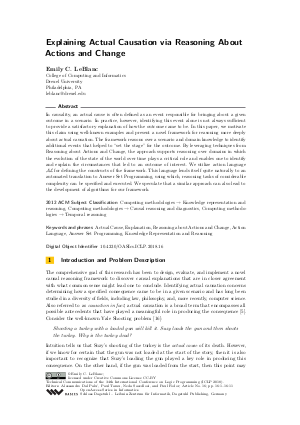Explaining Actual Causation via Reasoning About Actions and Change
Author Emily C. LeBlanc
-
Part of:
Volume:
Technical Communications of the 34th International Conference on Logic Programming (ICLP 2018)
Part of: Series: Open Access Series in Informatics (OASIcs)
Part of: Conference: International Conference on Logic Programming (ICLP) - License:
 Creative Commons Attribution 3.0 Unported license
Creative Commons Attribution 3.0 Unported license
- Publication Date: 2018-11-19
File

PDF
OASIcs.ICLP.2018.16.pdf
- Filesize: 387 kB
- 11 pages
Document Identifiers
Subject Classification
ACM Subject Classification
- Computing methodologies → Knowledge representation and reasoning
- Computing methodologies → Causal reasoning and diagnostics
- Computing methodologies → Temporal reasoning
Keywords
- Actual Cause
- Explanation
- Reasoning about Actions and Change
- Action Language
- Answer Set Programming
- Knowledge Representation and Reasoning
Metrics
- Access Statistics
-
Total Accesses (updated on a weekly basis)
0Document
0Metadata
Abstract
In causality, an actual cause is often defined as an event responsible for bringing about a given outcome in a scenario. In practice, however, identifying this event alone is not always sufficient to provide a satisfactory explanation of how the outcome came to be. In this paper, we motivate this claim using well-known examples and present a novel framework for reasoning more deeply about actual causation. The framework reasons over a scenario and domain knowledge to identify additional events that helped to "set the stage" for the outcome. By leveraging techniques from Reasoning about Actions and Change, the approach supports reasoning over domains in which the evolution of the state of the world over time plays a critical role and enables one to identify and explain the circumstances that led to an outcome of interest. We utilize action language AL for defining the constructs of the framework. This language lends itself quite naturally to an automated translation to Answer Set Programming, using which, reasoning tasks of considerable complexity can be specified and executed. We speculate that a similar approach can also lead to the development of algorithms for our framework.
Cite As Get BibTex
Emily C. LeBlanc. Explaining Actual Causation via Reasoning About Actions and Change. In Technical Communications of the 34th International Conference on Logic Programming (ICLP 2018). Open Access Series in Informatics (OASIcs), Volume 64, pp. 16:1-16:11, Schloss Dagstuhl – Leibniz-Zentrum für Informatik (2018)
https://doi.org/10.4230/OASIcs.ICLP.2018.16
BibTex
@InProceedings{leblanc:OASIcs.ICLP.2018.16,
author = {LeBlanc, Emily C.},
title = {{Explaining Actual Causation via Reasoning About Actions and Change}},
booktitle = {Technical Communications of the 34th International Conference on Logic Programming (ICLP 2018)},
pages = {16:1--16:11},
series = {Open Access Series in Informatics (OASIcs)},
ISBN = {978-3-95977-090-3},
ISSN = {2190-6807},
year = {2018},
volume = {64},
editor = {Dal Palu', Alessandro and Tarau, Paul and Saeedloei, Neda and Fodor, Paul},
publisher = {Schloss Dagstuhl -- Leibniz-Zentrum f{\"u}r Informatik},
address = {Dagstuhl, Germany},
URL = {https://drops.dagstuhl.de/entities/document/10.4230/OASIcs.ICLP.2018.16},
URN = {urn:nbn:de:0030-drops-98827},
doi = {10.4230/OASIcs.ICLP.2018.16},
annote = {Keywords: Actual Cause, Explanation, Reasoning about Actions and Change, Action Language, Answer Set Programming, Knowledge Representation and Reasoning}
}
Author Details
References
-
Marcello Balduccini and Michael Gelfond. Diagnostic reasoning with A-Prolog. arXiv preprint cs/0312040, 2003.

-
Chitta Baral and Michael Gelfond. Reasoning agents in dynamic domains. In Logic-based artificial intelligence, pages 257-279. Springer, 2000.

-
Vitaliy Batusov and Mikhail Soutchanski. Situation calculus semantics for actual causality. In 13th International Symposium on Commonsense Reasoning. University College London, UK. Monday, November, volume 6, 2017.

-
Sander Beckers and Joost Vennekens. A general framework for defining and extending actual causation using CP-logic. International Journal of Approximate Reasoning, 77:105-126, 2016.

-
Charles E Carpenter. Concurrent Causation. University of Pennsylvania Law Review and American Law Register, 83(8):941-952, 1935.

-
Thomas Eiter, Wolfgang Faber, Nicola Leone, Gerald Pfeifer, and Axel Polleres. Answer set planning under action costs. Journal of Artificial Intelligence Research, 19:25-71, 2003.

-
Esra Erdem, Michael Gelfond, and Nicola Leone. Applications of Answer Set Programming. AI Magazine, 37(3), 2016.

-
Michael Gelfond and Vladimir Lifschitz. The stable model semantics for logic programming. In ICLP/SLP, volume 88, pages 1070-1080, 1988.

-
Michael Gelfond and Vladimir Lifschitz. Classical negation in logic programs and disjunctive databases. New generation computing, 9(3-4):365-385, 1991.

-
Clark Glymour and David Danks. Actual causation: a stone soup essay. Synthese, 175(2):169-192, 2010.

-
Ned Hall. Two concepts of causation. Causation and counterfactuals, pages 225-276, 2004.

-
Ned Hall. Structural equations and causation. Philosophical Studies, 132(1):109-136, 2007.

-
Joseph Y Halpern. Axiomatizing causal reasoning. Journal of Artificial Intelligence Research, 12:317-337, 2000.

-
Joseph Y Halpern. Actual causality. MIT Press, 2016.

-
Joseph Y Halpern and Judea Pearl. Causes and explanations: A structural-model approach. Part I: Causes. The British journal for the philosophy of science, 56(4):843-887, 2005.

-
Steve Hanks and Drew McDermott. Nonmonotonic logic and temporal projection. Artificial intelligence, 33(3):379-412, 1987.

-
Patrick J. Hayes and John McCarthy. Some Philosophical Problems from the Standpoint of Artificial Intelligence. In B. Meltzer and D. Michie, editors, Machine Intelligence 4, pages 463-502. Edinburgh University Press, 1969.

-
Mark Hopkins and Judea Pearl. Causality and counterfactuals in the situation calculus. Journal of Logic and Computation, 17(5):939-953, 2007.

-
David Lewis. Causation. The journal of philosophy, 70(17):556-567, 1974.

-
J. McCarthy and P. J. Hayes. Some philosophical problems from the standpoint of artificial intelligence. Readings in artificial intelligence, pages 431-450, 1969.

-
Peter Menzies. Counterfactual theories of causation. The Stanford Encyclopedia of Philosophy, 2001.

-
Judea Pearl. On the definition of actual cause, 1998.

-
Joost Vennekens. Actual causation in CP-logic. Theory and Practice of Logic Programming, 11(4-5):647-662, 2011.

